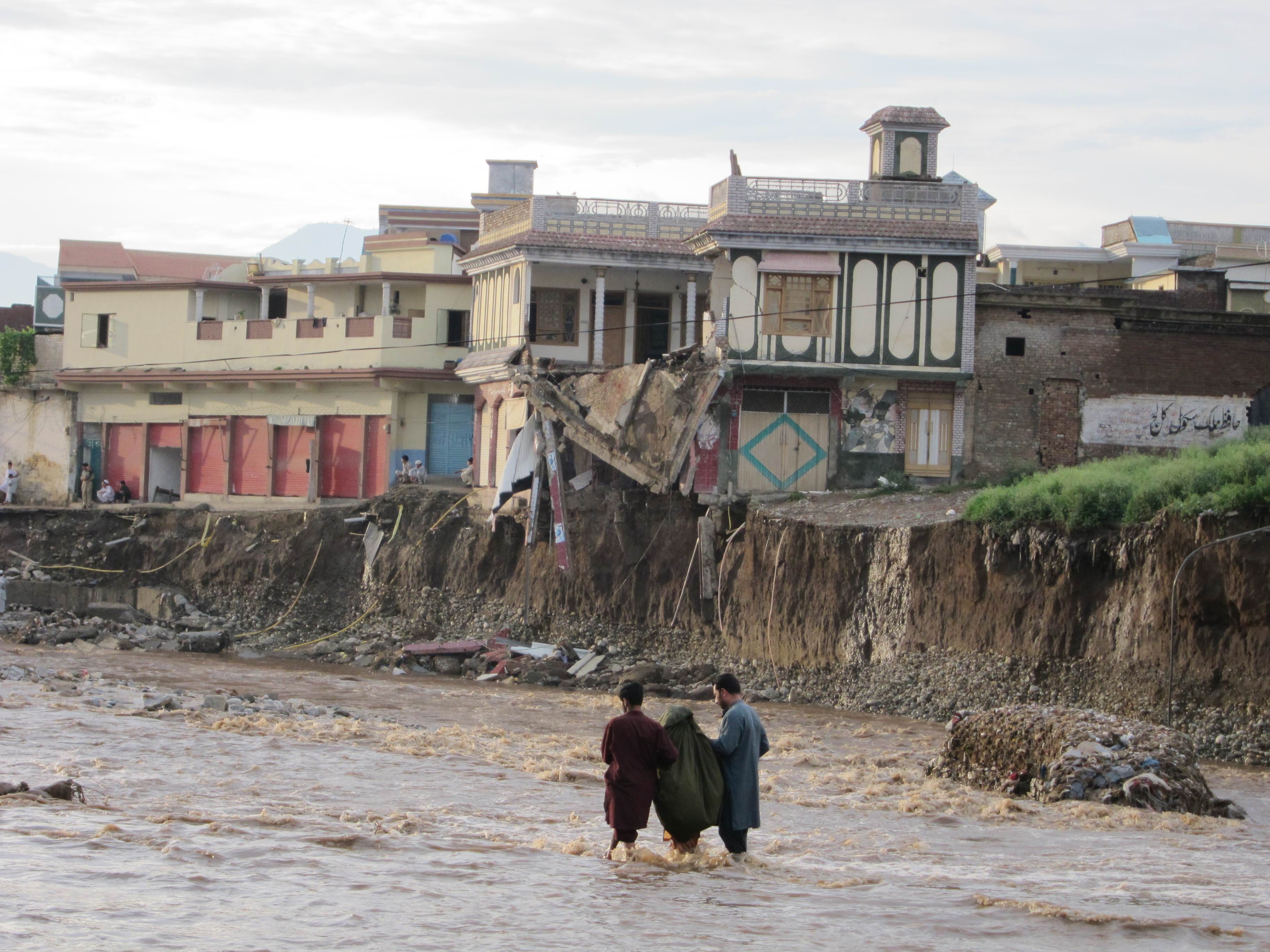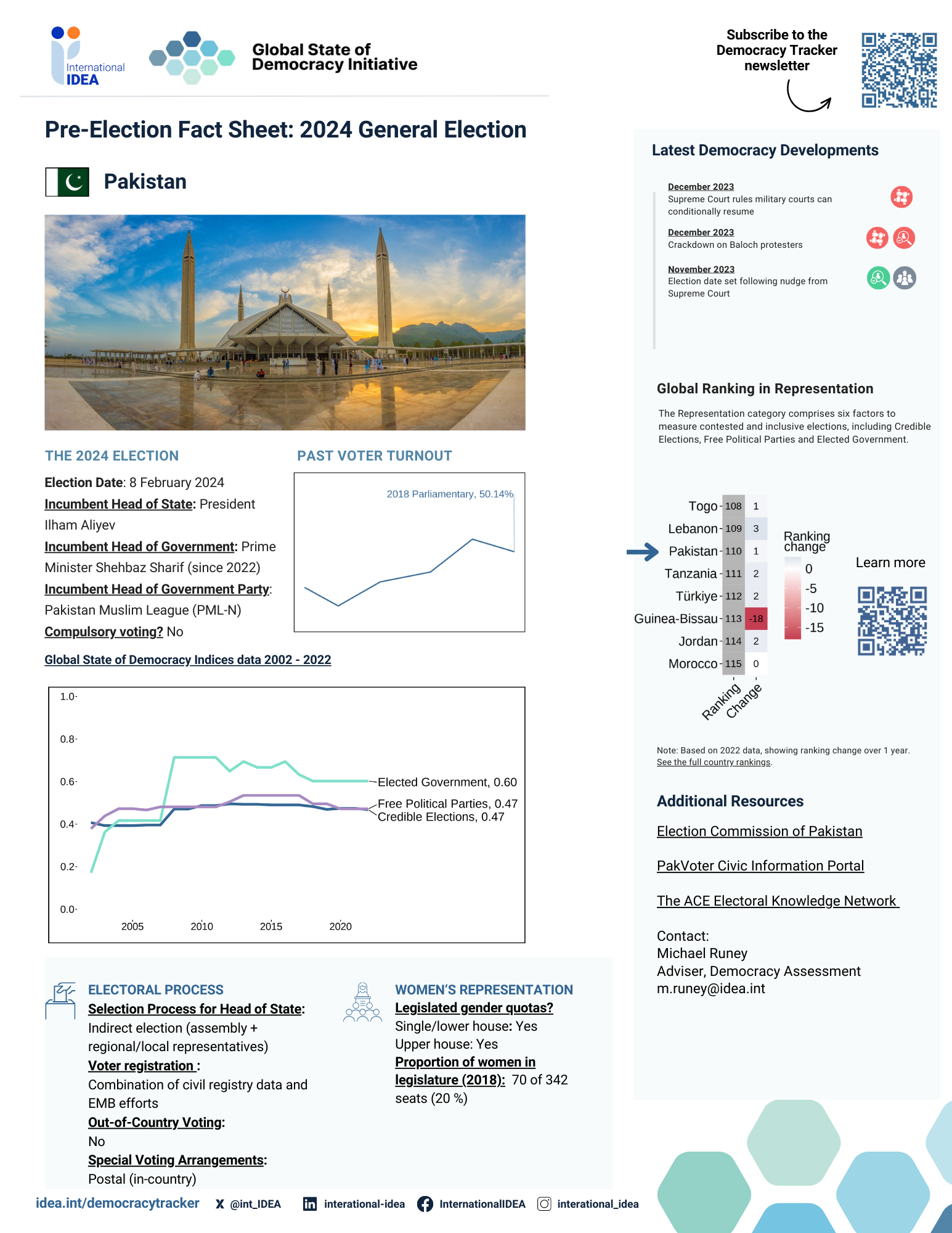
Pakistan
Pakistan performs at the mid-range level in two Global State of Democracy categories - Representation and Participation - and in the low range in Rights and the Rule of Law. It falls among the bottom 25 per cent of the world in several factors, including Basic Welfare, Gender Equality, Personal Integrity and Security, and Freedom of Religion, while in the top 25 per cent in Inclusive Suffrage. Over the past five years, Pakistan has experienced a significant decline in Free Political Parties. Pakistan’s lower middle-income economy relies mainly on services (wholesale and retail), agriculture, and industry, and suffers from high levels of government and external debt. Poor education and literacy rates as well as weak governance and corruption are also significant challenges.
Pakistan was borne out of a hastily drawn and violent partition from British India in 1947. The Muslim-majority state struggled with nation-building, and has experienced three spells of military dictatorship over three decades – the most recent of which ended in 2008. Even during democratic rule, which frequently alternated between family dynasties, the military has retained its presence. Further difficulties emanate from political instability, with no prime minister having ever served a full term.
Political leaders have exploited religious and ethnic cleavages, with Pakistan having one of the highest levels of social hostilities involving religion. Blasphemy laws, which predominantly affect Muslims, carry the death penalty and encourage vigilantism. These laws also impact the Ahmadiyya Muslim Community (deemed by the Constitution of Pakistan to be non-Muslims) and non-Muslim minorities. Ethnopolitical cleavages exist between the state and various ethnic groups, and between and within ethnic groups (Muhajirs, Pashtuns, Sindhis, and Baluchs). Nationalist insurgency from separatists in Pakistan’s Balochistan Province adds further complexity, which Pakistani authorities have reportedly responded to with enforced disappearances and extrajudicial killings. Moreover, the forced return of hundreds of thousands of Afghan refugees and undocumented migrants has drawn international criticism.
Relations with and perceived threats from India are consistent political issues. War has broken out between Pakistan and India four times, three of which were over the disputed Kashmir region, where tensions persist. Terrorism further complicates the security picture. The Tehrik-e Taliban Pakistan (TTP) ended a ceasefire agreement with the Pakistani government in 2022, with physical insecurity and tensions between Pakistan and Afghanistan rising as the latter is accused of sheltering the TTP, and democratic progress hindering as a result.
Women and girls in Pakistan face multiple barriers, perpetuated by a highly patriarchal society, regressive social norms and gender stereotypes, impacting their right to health, education, employment and political participation. Particularly striking is the severe gender gap in voting and access to finance – the latter aggravating chronic poverty. Furthermore, despite the passing of the Transgender Rights Bill in 2018, the ruling by the Federal Shariah Court striking down provisions in the bill is seen as a major setback to LGBTQIA+ rights.
Climate change is an underlying political issue in Pakistan. Set to experience rates of warming ‘considerably above the global average’, climate change has the potential to exacerbate existing challenges, as seen in the 2005 Kashmir earthquake and floods of 2010, 2011, 2022, and 2024.
Looking ahead, it will be important to watch Representation and Rights – considering the military’s continuing influence in Pakistani politics and increasing repression of protests, including through Internet shutdowns. Amid a deepening governance crisis, it is necessary to monitor the Rule of Law in Pakistan, as its increasingly assertive Supreme Court predominantly acts as a mediator of political conflict. Lastly, as one of the world’s most vulnerable countries to climate change, it is necessary to watch how Pakistan responds to citizens’ concerns and mitigates its impacts – including its potential to inhibit improvements in Basic Welfare.
Last Updated: June 2024
https://www.idea.int/democracytracker/
January 2025
Government cracks down on digital expression
In January, Pakistan’s parliament enacted amendments to the Prevention of Electronic Crimes Act (PECA), criminalizing the spread of “fake or false information” with penalties of fines or up to three years in prison. The amendments create four new government-controlled bodies to regulate online content. Rights experts and media advocates have widely condemned the bill for undermining what little is left of digital expression in the country and for containing vague and overbroad language. The previous PECA was known for targeting journalists critical of the government and the new amendments are seen as further stifling press freedom. Prohibited content includes publications opposing “the ideology of Pakistan”, disrupting civic life through public intimidation, or criticizing individuals, including the judiciary, armed forces, parliament, or provincial assembly members. The bill faced backlash for lacking adequate civil society consultation. The development follows parliament’s passage of the Digital Nation Pakistan Bill 2025, aimed at establishing citizens’ digital identities and centralizing economic, social and governance data. Rights experts have raised concerns over privacy rights and the country’s shift toward a surveillance state.
Sources: Dawn, Deutsch Welle, International Federation of Journalists, Human Rights Watch, IFEX
December 2024
Surge in civilian and security casualties in 2024
In 2024, Pakistan saw a 66 per cent increase in deaths from terrorism and counter-terrorism from 2023, according to a recent report from the Pakistan Center for Research and Security Studies. In total, 2,546 people are reported to have died, including civilians and security personnel. The figures mark 2024 as one of the deadliest years for security forces in nearly a decade. 94 per cent of terror-related fatalities occurred in Balochistan and Khyber Pakhtunkhwa, regions which only account for 23 per cent of the population. Nearly twice as many deaths occurred in Balochistan compared to 2023. The Pakistani Taliban (formally Tehreek-e-Taliban-e-Pakistan) and the Baloch Liberation Army were responsible for a majority of attacks.
Sources: Center for Research and Security Studies, Al Jazeera, Deutsche Welle (DW)
November 2024
PTI supporters protesting Imran Khan’s release face large-scale arrests
At the end of November, thousands of supporters of the opposition Pakistan Tehreek-e-Insaf (PTI) party marched from Peshawar to Islamabad (160 kms) to protest for the release of imprisoned former Prime Minister Imran Khan. Between 24 and 26 November, police and army forces arrested over 1,000 protestors. The protests are part of continuous and escalating clashes between Khan supporters and state forces. The recent protests are particularly remarkable for directly defying the military, the intense backlash from state forces and their sheer scale. Police and army forces locked down Islamabad, banning all assemblies, blocking the roads with shipping containers, and closing all educational institutions. Internet and telecommunication services were partially shut down as well. Under recent legislation, protests in certain parts of Islamabad, called “red zones”, have been severely limited, while punishments for participating in illegal assemblies have greatly increased.
Sources: Straits Times (1), Straits Times (2), Al Jazeera, Deutsche Welle (DW), International IDEA, Dawn
October 2024
Bill passed that allows parliamentary committee to elect Supreme Court’s Chief Justice
On 21 October, the Parliament of Pakistan passed the 26th Constitutional Amendment Act, 2024, which grants the authority for naming the Chief Justice of the Supreme Court to a special Parliamentary Committee whose members are selected by leaders of parliamentary political parties. Previously, the next most senior judge was named Chief Justice automatically. The amendment further introduced a three-year term for chief justices. The bill was passed just before the current Chief Justice Qazi Faez Isa is scheduled to retire, and his scheduled replacement under the previous regulations would have been justice Mansoor Ali Shah, who has previously issued verdicts in favour of former Prime Minister Imran Khan and his party. The act gives the parliament increased power over the judiciary, and Volker Türk, the UN High Commissioner for Human Rights, warns that the bill threatens judicial independence.
Sources: National Assembly of Pakistan, Al Jazeera, The Economist
Government bans Pashtun Protection Movement
On 6 October, the Pakistan government banned the Pashtun Protection Movement (Pashtun Tahafuz Movement, PTM), an ethnic social movement for Pashtun rights in Pakistan. The Interior Ministry cited peace and security concerns, putting the PTM on the list of proscribed organizations under the country’s anti-terrorism laws. The ban occurred just a few days before a planned assembly of PTM leaders and resulted in protests from PTM supporters, during which three people were killed in clashes with police. Human rights groups warn that banning the PTM is a continuation of the government crackdown on both voices critical of the military establishment and supporters of the former Prime Minister Imran Khan.
Sources: New York Times, Arab News, Al Jazeera, Amnesty International, Himal Southasian
See all event reports for this country
Global ranking per category of democratic performance in 2023
Basic Information
Human Rights Treaties
Performance by category over the last 6 months
Blogs
Election factsheets
Global State of Democracy Indices
Hover over the trend lines to see the exact data points across the years
Factors of Democratic Performance Over Time
Use the slider below to see how democratic performance has changed over time

